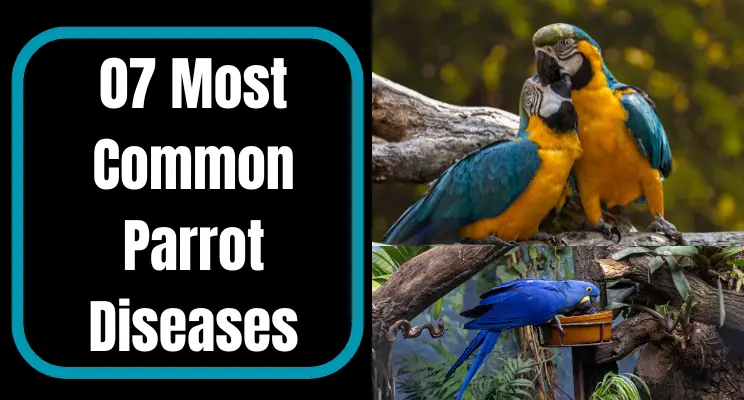Discover the most common parrot diseases, their symptoms, treatments, and prevention tips to keep your feathered friend happy and healthy.
Keeping your pet healthy and disease-free requires proper care and attention. A balanced diet, regular grooming, and a clean environment are essential for their well-being. Routine vet check-ups, vaccinations, and parasite control help prevent serious illnesses. Ensuring sufficient exercise and mental stimulation boosts immunity and reduces stress. Avoiding contact with sick animals and recognizing early signs of illness can prevent health complications.
Table of Contents

Introduction
Parrots are intelligent, social, and affectionate birds, but like all pets, they are prone to various health issues. Understanding common parrot diseases, their symptoms, and how to prevent them is crucial for every bird owner. In this blog post, we’ll explore the most prevalent parrot diseases and provide effective strategies to keep your feathered companion in top shape. How to train a parrot check this guide you will know how to train a parrot.
1. Psittacosis (Parrot Fever)
| Causes | Symptoms | Prevention & Treatment |
|---|---|---|
| Bacterial infection caused by Chlamydia psittaci. | Lethargy | Maintain proper hygiene and clean cages regularly. |
| Loss of appetite | Provide a well-balanced diet and avoid stress. | |
| Greenish droppings | If infected, consult an avian vet immediately for antibiotics. | |
| Difficulty breathing |
2. Avian Bornavirus (PDD – Proventricular Dilatation Disease)
| Causes | Symptoms | Prevention & Treatment |
|---|---|---|
| Viral infection affecting the digestive and nervous system. | Weight loss despite a good appetite | Quarantine new birds before introducing them to existing pets. |
| Undigested food in droppings | Provide a stress-free environment to boost immunity. | |
| Neurological issues (seizures, imbalance) | No definitive cure, but supportive care can improve life quality. |
3. Aspergillosis
| Causes | Symptoms | Prevention & Treatment |
|---|---|---|
| Fungal infection due to mold exposure. | Respiratory distress (wheezing, coughing) | Keep the cage and food dry to prevent mold growth. |
| Weakness and loss of energy | Ensure proper ventilation. | |
| Poor feather condition | Antifungal medications prescribed by a vet. |
4. Polyomavirus
| Causes | Symptoms | Prevention & Treatment |
|---|---|---|
| A highly contagious viral disease affecting young parrots. | Sudden weight loss | Vaccination for breeding birds. |
| Swollen abdomen | Isolate infected birds immediately. | |
| Abnormal feather growth | Proper cage sanitation and hygiene. | |
| Sudden death in chicks |
5. Beak And Feather Disease (PBFD)
| Causes | Symptoms | Prevention & Treatment |
|---|---|---|
| Viral infection affecting the immune system. | Feather loss | No cure is available; prevention is key. |
| Beak abnormalities | Avoid exposure to infected birds. | |
| Depression and weakness | Boost immunity with a healthy diet and low-stress environment. |
6. Candidiasis (Yeast Infection)
| Causes | Symptoms | Prevention & Treatment |
|---|---|---|
| Fungal overgrowth in the digestive tract. | White lesions in the mouth | Provide a diet rich in probiotics. |
| Regurgitation | Maintain cage hygiene. | |
| Poor appetite | Antifungal medication prescribed by a vet. |
7. Parasitic Infections
| Causes | Symptoms | Prevention & Treatment |
|---|---|---|
| Internal and external parasites (mites, lice, worms). | Feather plucking | Regular vet check-ups. |
| Skin irritation | Maintain cage cleanliness. | |
| Weight loss | Use anti-parasitic medications as prescribed. |
General Tips To Keep Your Parrot Healthy
- Provide a nutrient-rich diet with fresh fruits, vegetables, and pellets.
- Ensure adequate cage hygiene and regular disinfection.
- Give your parrot mental and physical stimulation to reduce stress.
- Schedule routine vet visits for early disease detection.
- Avoid exposing your parrot to sick birds or unsanitary environments.
Frequently Asked Questions (FAQs)
How do I know if my parrot is sick?
Look for signs like loss of appetite, lethargy, unusual droppings, feather plucking, and respiratory issues. Consult a vet if you notice any abnormal behavior.
Can I prevent all parrot diseases?
While you cannot prevent all diseases, maintaining hygiene, a balanced diet, and regular vet check-ups can significantly reduce the risks.
How often should I take my parrot to the vet?
At least once a year for a routine check-up, but immediately if you notice any signs of illness.
Is Psittacosis contagious to humans?
Yes, it is a zoonotic disease and can transfer to humans. Proper hygiene and immediate treatment are essential.
What should I do if my parrot refuses to eat?
A sudden loss of appetite could indicate an underlying health issue. Try offering different foods and consult a vet if the issue persists.
Conclusion
Keeping your parrot healthy requires proactive care, regular check-ups, and a well-maintained environment. Understanding common parrot diseases, their symptoms, and prevention measures can help you ensure a long and happy life for your feathery companion. Always consult a vet if you suspect any health issues. To know more about the common parrot diseases check this article!!!
Hope after reading this blog post you will understand the common parrot diseases and how to prevent them. If you want to know more about parrot diseases please let us know we will provide you the more information on it.




1 thought on “07 Most Common Parrot Diseases & How To Prevent Them”